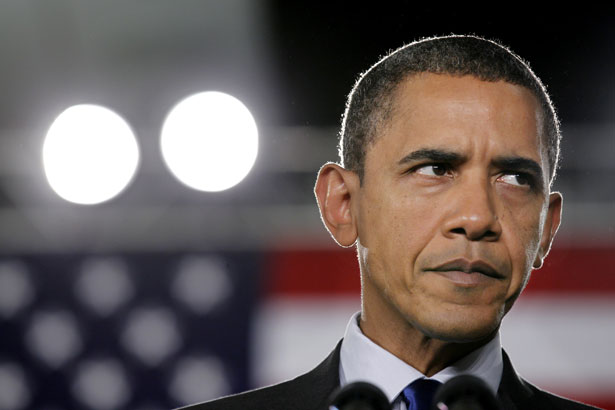Psychiatry From A Distance
The Atlantic cover story, "The Mind Of Donald Trump," is the kind of article you see on a regular basis, where a politician is put on the couch. These pieces are simplistic, though generally harmless, and occasionally insightful. This latest, by Dan P. McAdams, has some interesting details, if not exactly shocking conclusions--Trump is an extrovert and narcissist who's not especially interested in being agreeable.
The trouble with this sort of analysis is the conclusions tend to track with the writer's pre-set politics. McAdams, in fact, already has a book out that purports to be a psychological portrait of George W. Bush. I haven't read it, but seeing his short profiles of Bush and Obama in the Trump piece make me question how insightful he is.
Bush, he says, is incurious. As McAdams puts it, in his clinical way, Bush has "high levels of extroversion and very low openness" and thus was "predisposed to make bold decisions aimed at achieving big rewards, and to make them with the assurance that he could not be wrong."
Obama, on the other hand, was fairly introverted for a President, very low on the neurotic scale, and quite curious. And whereas Bush made a bold but questionable decision to invade Iraq after 9/11, Obama
inherited a devastating recession, and after the 2010 midterm elections, he struggled with a recalcitrant Republican Congress. What kinds of decision might he have made had these events not occurred? We will never know.
You don't have to be a psychologist (in fact, it's probably best if you're not) to see McAdams' politics lurking behind these allegedly objective appraisals.
Let's imagine how someone with different politics from McAdams might look at these two and get a completely opposite reading.
First, Bush. Here's a guy who's very open. He was a popular, wheeler-dealer governor of Texas who knew how to work both sides. He read widely, and listened to advisors before making decisions. Once President, he was willing to go across the aisle, sometimes to the detriment of his popularity within his own party (such as his extension of Medicare and his immigration proposal). Furthermore, he regularly went to Congress to get permission for many of his biggest moves, and often found bipartisan support--for the War in Iraq, to pick one example.
Yes, he was making bold moves, but that's to be expected after a game-changing event like 9/11. In fact, his stance on Iraq was fairly consistent with American policy. It was President Clinton who decided America should support regime change--we were essentially at war with Iraq already, and maintaining a tenuous truce where we kept Saddam Hussein militarily boxed in. The Democrats of Clinton's day spoke openly of the need to do something about Hussein's weapons of mass destruction. It's not surprising that Bush, after 9/11, would go to Iraq. If anything, it's surprising he took so long. First he went to Afghanistan, and it was a year and a half after 9/11 before he began the U.S.-led invasion of Iraq--supported by Congress and the American public. (It's true many on the left were unhappy about it. This seems to have helped lead to the claim that Bush was incurious--they lost the argument and figured it must be because he wouldn't listen to them.) In fact, if Bush hadn't invaded Iraq, it could have been a problem in his reelection--it's easy to imagine someone like John Kerry saying he had the military experience to deal with Iraq, while Bush doesn't seem to have the stomach for it.
Then there's Barack Obama, close-minded and sure of himself. Oh, he knew the arguments on the other side, it just never occurred to him they could be correct. This is why as a Senator he had the furthest-left voting record. He ran as someone with a bold vision, someone who would fundamentally transform America. Was America so bad it needed such transformation? No matter, everything would be swept away in Obama's new order.
He won the White House and when Republicans in Congress tried to negotiate, he famously told them "I won." In other words, his idea of compromise was everyone agreeing with him.
He wasn't good at listening to his advisors, either. He thought he was the smartest in the room, no matter what the subject. By the end of Bush's term, things had turned around in Iraq, and the country was essentially pacified. This lower level of violence continued for the first few years of the Obama presidency. His generals advised him to keep a certain level of troops in the country, but incurious Obama knew better. He pulled out all troops and, as predicted, the country--indeed, the entire region--descended into chaos. (He also attacked Libya against the advice of military advisors--and did it, unlike Bush, without getting permission from Congress.)
But the best example of his unbending attitude and lack of openness was Obamacare. We don't have to wonder what kind of decisions Obama might have made with a Congress predisposed toward him, since that's what he had for his first two years. This Congress was not just Democrat, but filibuster-proof. He could pass just about anything he wanted, and not give in even slightly to the Republicans. Which is what he did.
Obamacare was unpopular from the start. The vast majority of Americans liked their health care plans and didn't want them monkeyed with. Obama made countless speeches promoting his new insurance plan (even saying things that weren't really true, which he either didn't care about, or wasn't curious enough to find out about), but couldn't make his program popular. Indeed, the public kept begging the politicians not to pass this bill--they even elected a Republican senator in Massachusetts to stop it. But Obama was not in the mood to listen, and did everything he could to see the law was rammed through, despite the will of the public, despite the arguments against it, despite parliamentary procedure.
Afterwards, the law remained unpopular, but Obama had the personality type that can't admit mistakes and kept insisting it was working, and that the public wanted it. It even contributed to the Democrats' loss of Congress. Now he had a true chance to show his openness, because if he wanted to get things done, he'd have to negotiate with Republicans--but he was so stubborn, and sure he was right, that he didn't feel the need to give in. Indeed, he referred to all disagreement with his policies as "bickering" which needed to end, so very little got done.
I'd like to see The Atlantic publish that and then read the comments.



7 Comments:
You are going to need a chiropractor after all that twistng
Just lie back and think of England, Anonymous. You know you wanted it.
That is terrific! I'd like to see the Wall Street Journal publish that, let alone the Atlantic! Do you ever submit op-eds anywhere besides here?
To anon: These aren't my ideas, I'm just saying this is what it would look like if a conservative wrote about the psychological profiles of Presidents, rather than the more common liberal take we tend to get.
To Denver Guy: This blog is just my idle chatter. If you want to spread the word, feel free to send a link to Instapundit.
Neat parlor trick. Do one for Hitler now
Too late. Countless Democrats have already explained why Bush is just like Hitler.
Yes, and now Trump is even *worse* than Hitler. If you aren't careful, you'd think every Republican is Hitler.
Post a Comment
<< Home